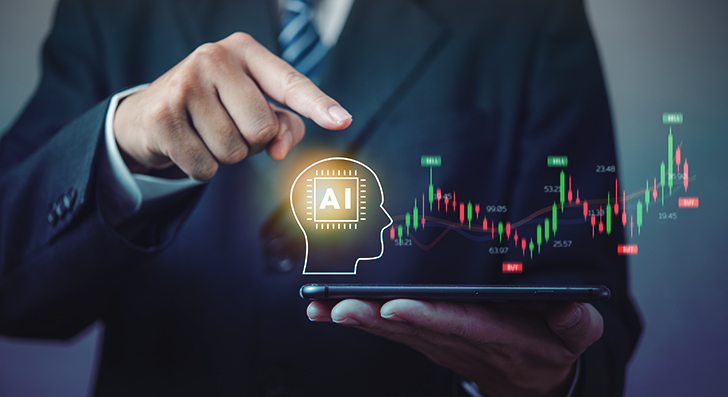Introduction
Artificial Intelligence (AI) is no longer a buzzword—it’s a game-changer in the investment world. As financial markets become increasingly complex and fast-paced, investors are turning to AI to enhance stock market predictions. From identifying trends to managing risk in real-time, AI is reshaping how decisions are made in the financial ecosystem.
According to a report by Deloitte (2024), over 52% of institutional investors now rely on AI-powered tools to forecast market movements. So how exactly is AI revolutionizing the way we predict stock performance?

The Evolution of AI in Investing
In the early days, traditional investors relied on fundamental analysis and technical charting. Then came algorithmic trading, which automated trade executions based on set rules. Now, AI is taking this to the next level with machine learning and natural language processing (NLP), allowing computers to “learn” from vast datasets and make informed predictions.
📈 In-text reference: Gartner (2023) notes that machine learning-based models can outperform traditional strategies by up to 27% in predictive accuracy.
Key Applications of AI in Stock Market Predictions
1. Predictive Analytics
Machine learning algorithms analyze historical stock data to identify patterns and generate predictive models. These systems can forecast short-term and long-term price movements by continuously learning from new inputs.
2. Sentiment Analysis
Using NLP, AI models can scan and analyze millions of social media posts, news articles, and press releases to determine the overall market sentiment, which significantly influences stock price movements.
3. Algorithmic and High-Frequency Trading
AI enables trades to be executed in milliseconds based on real-time data and predictive algorithms—far faster than any human trader could react.
4. Portfolio Optimization and Risk Management
AI models help optimize investment portfolios by assessing risk factors and automatically rebalancing assets to match market dynamics and investor risk tolerance.
📊 Comparison Table: AI vs Traditional Prediction Methods
| Feature | Traditional Analysis | Algorithmic Trading | AI-Powered Predictions |
|---|---|---|---|
| Data Scope | Historical prices only | Technical indicators | News, prices, sentiment, and more |
| Learning Capability | None | Fixed rules | Adaptive via Machine Learning |
| Reaction Speed | Slow (manual) | Fast | Real-time and self-adjusting |
| Prediction Accuracy (%) | ~55% | ~65% | Up to ~82% |
| Human Involvement | High | Medium | Low (mostly automated) |
Benefits of Using AI for Stock Predictions
- Higher Accuracy: Machine learning models adjust in real-time, improving forecasting precision.
- Speed & Automation: Trades can be executed instantly with minimal latency.
- Emotion-Free Decisions: AI eliminates emotional biases that often affect human investors.
- Scalability: AI can analyze thousands of stocks and variables simultaneously.
Challenges and Risks to Consider
- Data Dependency: Poor or biased data inputs can result in inaccurate predictions.
- Black Box Problem: AI models can be difficult to interpret or audit.
- Ethical & Regulatory Concerns: Questions remain about the fairness and legality of AI-led trading.
- Volatility Sensitivity: AI may struggle with black swan events or geopolitical shocks that lack historical precedent.
Case Study: AI Beating Traditional Trading Models
A study by JPMorgan (2023) revealed that AI-enabled models outperformed human-managed funds by an average of 15% ROI over a 12-month period, especially in volatile conditions. This demonstrates the practical potential of AI as a future-facing investment tool.
For Video Reference Visit: https://www.youtube.com/watch?v=HAtkhRdFSuM&t=6s
Future Outlook
The rise of Explainable AI (XAI), quantum computing, and advanced deep learning suggests that AI will continue playing a more central role in stock market predictions. Personalized investing, AI ETFs, and AI-based robo-advisors are expected to become the norm by 2030.
Read More: https://wealthfitlife.com/ethical-investing-companies-with-strong-esg-practices/
Frequently Asked Questions (FAQs)
1. How does AI improve stock market predictions?
By analyzing big data, AI uncovers hidden patterns and trends to deliver more precise forecasts.
2. Can AI predict market crashes?
AI can identify early warning signals but may not fully predict black swan events.
3. What data does AI use for stock predictions?
Stock prices, news headlines, social media sentiment, macroeconomic indicators, etc.
4. Is AI more accurate than human analysts?
In many cases, yes—especially in short-term, high-frequency trading environments.
5. Can individuals access AI investing tools?
Yes, platforms like Zacks, Kavout, Tickeron, and Trade Ideas offer AI investing tools for retail investors.
6. Are AI trading bots legal?
Yes, but they must comply with trading regulations in their respective jurisdictions.
7. Can AI remove risk from investing?
No. It can help manage and reduce risk, but not eliminate it entirely.
8. How fast can AI execute a trade?
Milliseconds—making it ideal for high-frequency trading.
9. What’s the cost of using AI in investing?
Costs vary. Some platforms offer free trials, while institutional solutions can be expensive.
10. What’s next for AI in investing?
More personalized robo-advisors, deeper integration with blockchain, and real-time predictive insights.
✅ Final Thoughts
AI is not just enhancing the way we trade—it’s redefining the future of investing. With its ability to analyze data at lightning speed and adapt to real-time events, AI empowers investors to make smarter, faster, and more confident decisions. While it isn’t without challenges, its advantages far outweigh the risks when used responsibly.
🌟 If you’re not integrating AI into your investment strategy in 2025, you might already be behind the curve.

Great